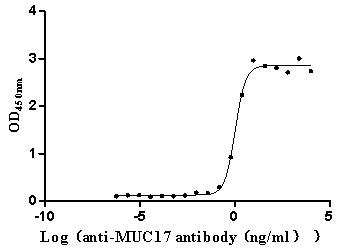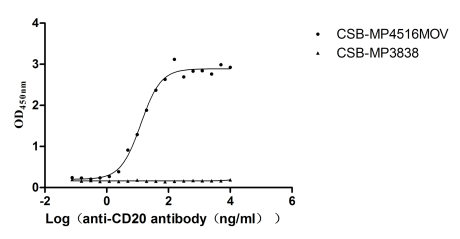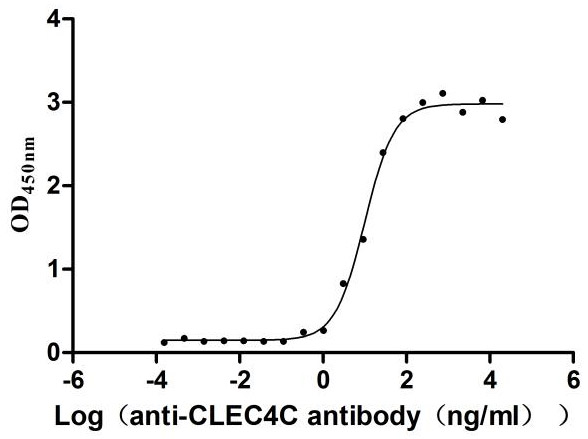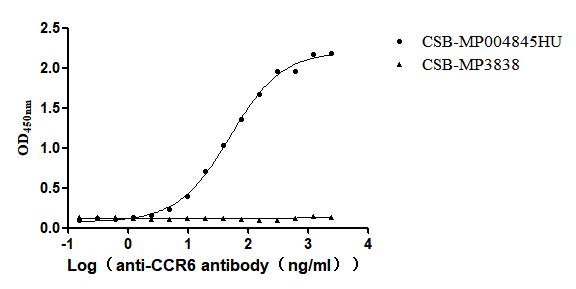Recombinant Human Oxytocin receptor (OXTR), partial
-
货号:CSB-YP017316HU
-
规格:
-
来源:Yeast
-
其他:
-
货号:CSB-EP017316HU
-
规格:
-
来源:E.coli
-
其他:
-
货号:CSB-EP017316HU-B
-
规格:
-
来源:E.coli
-
共轭:Avi-tag Biotinylated
E. coli biotin ligase (BirA) is highly specific in covalently attaching biotin to the 15 amino acid AviTag peptide. This recombinant protein was biotinylated in vivo by AviTag-BirA technology, which method is BriA catalyzes amide linkage between the biotin and the specific lysine of the AviTag.
-
其他:
-
货号:CSB-BP017316HU
-
规格:
-
来源:Baculovirus
-
其他:
-
货号:CSB-MP017316HU
-
规格:
-
来源:Mammalian cell
-
其他:
产品详情
-
纯度:>85% (SDS-PAGE)
-
基因名:
-
Uniprot No.:
-
别名:OT R; OT-R; OTR 1; OTR; OTR1; OXT R; Oxtr; OXYR_HUMAN; Oxytocin receptor
-
种属:Homo sapiens (Human)
-
蛋白长度:Partial
-
蛋白标签:Tag type will be determined during the manufacturing process.
The tag type will be determined during production process. If you have specified tag type, please tell us and we will develop the specified tag preferentially. -
产品提供形式:Lyophilized powder
Note: We will preferentially ship the format that we have in stock, however, if you have any special requirement for the format, please remark your requirement when placing the order, we will prepare according to your demand. -
复溶:We recommend that this vial be briefly centrifuged prior to opening to bring the contents to the bottom. Please reconstitute protein in deionized sterile water to a concentration of 0.1-1.0 mg/mL.We recommend to add 5-50% of glycerol (final concentration) and aliquot for long-term storage at -20℃/-80℃. Our default final concentration of glycerol is 50%. Customers could use it as reference.
-
储存条件:Store at -20°C/-80°C upon receipt, aliquoting is necessary for mutiple use. Avoid repeated freeze-thaw cycles.
-
保质期:The shelf life is related to many factors, storage state, buffer ingredients, storage temperature and the stability of the protein itself.
Generally, the shelf life of liquid form is 6 months at -20°C/-80°C. The shelf life of lyophilized form is 12 months at -20°C/-80°C. -
货期:Delivery time may differ from different purchasing way or location, please kindly consult your local distributors for specific delivery time.Note: All of our proteins are default shipped with normal blue ice packs, if you request to ship with dry ice, please communicate with us in advance and extra fees will be charged.
-
注意事项:Repeated freezing and thawing is not recommended. Store working aliquots at 4°C for up to one week.
-
Datasheet :Please contact us to get it.
相关产品
靶点详情
-
功能:Receptor for oxytocin. The activity of this receptor is mediated by G proteins which activate a phosphatidylinositol-calcium second messenger system.
-
基因功能参考文献:
- transmembrane G protein-coupled receptor capable of binding to either Galphai or Galphaq proteins; activates a set of signaling cascades, such as the MAPK, PKC, PLC, or CaMK pathways, which converge on transcription factors like CREB or MEF-2 [review] PMID: 29897293
- This study demonstrated that OXTR SNP rs53576 was linked to social behaviors, and moderated the relation between rejection sensitivity and multiple group memberships. PMID: 28472899
- OXTR rs53576 and rs1042778 are associated with ASD clinical phenotypes. PMID: 29858823
- The present study for the first time suggests a gene-environment interaction effect of an OXTR gene variant with behavioral inhibition and possibly also symptoms of adult separation anxiety in the moderation of vulnerability for complicated grief. PMID: 29353531
- Gene-environment interaction between OXTR genotype and paternal parenting style influences young men's social responsivity to female cry vocalizations. PMID: 29355918
- Significant relationship between the ASD severity categories of DSM-5 and OXTR rs237902. PMID: 29428512
- In this case-control study, we investigated the associations between OXTR genetic variants and the risk of aggression. Our results suggested that OXTR rs237885 was significantly associated with an increased risk of aggression. Potential synergic additive interactions between the rs237885 TT genotype and childhood physical abuse were also found. PMID: 29306689
- OXTR SNPs (rs2254298, rs53576, rs2268498) do not interact with childhood maltreatment in the development of clinically diagnosed depression and anxiety disorders. PMID: 28353027
- In membranes from cells stably expressing the oxytocin receptor, oxytocin binding occurred with lower affinity as sodium chloride was increased. Mutations of this residue into Ala or Asn are known to yield non-functional oxytocin receptors. When Asp 85 was exchanged for Glu, a few functional receptors were found in the cell membrane but they did not show a sodium effect. PMID: 29524392
- The presence of both structural and functional changes in the brain of individuals carrying OXTR risk alleles, particularly in regions involved in emotional and social processing, and provide new insights into the neurobiological pathways involved in ASD etiology. PMID: 28322981
- Ten SNPs of OXTR were examined in 615 patients with obsessive-compulsive disorder (OCD) and 581 healthy controls. rs2268493 (p = 0.00185) and rs13316193 (p = 0.00461) of the OXTR gene were associated with the age at onset in patients with OCD. Also, the G-C-G haplotype of rs2268493-rs2254298-rs11316193 and the T-G-A haplotype of rs237887-rs2268490-rs4686301 were positively associated with late-onset OCD. PMID: 28915380
- OXTR DNA methylation was predictive of resilience in the conduct problems domain in middle childhood. DNA methylation profiles did not predict resilience in domains of emotional, hyperactivity, and global symptomatology, suggesting a potential role for OXTR in the development of conduct problems in particular. PMID: 29162179
- Polymorphisms in the OXTR gene and attachment style may contribute to vulnerability to PTSD in U.S. military veterans. PMID: 28715704
- Multilevel models revealed that history of care had a greater influence on maternal baseline cortisol(but not cortisol trajectory)for mothers with more plasticity alleles of SLC6A3 and OXTR, relative to mothers with fewer or no plasticity alleles. Findings indicate that a mother's history of care is related to her cortisol secretion in anticipation of infant stress, but this relation depends on her genetic characteristics PMID: 28890000
- Evidence implicates OXTR SNP rs53576 (G/A) variation as a "risk" allele for impaired social functioning in children and adolescents. PMID: 27520745
- Three OXTR polymorphisms (rs2270465, rs2268493, rs7632287) and 2 AVPR1A polymorphisms (rs1587097, rs1042615) showed nominal effects (p < .05) on vocal symptoms, of which 1 (rs1587097) remained significant after correcting for multiple testing (p = .003). Study found potential mediation of the effect of the OXTR rs2268493 polymorphism on vocal symptoms through levels of cortisol. PMID: 28687839
- GxE interaction involving OXTR rs53576: change in parenting from age 4 to 6 predicts change in student-teacher relationships from age 6 to 8. PMID: 28471218
- OXTR A allele with interacts with temperament and parenting to forecast young adults' allostatic load. PMID: 27292275
- The results of this study indicated that differences in implicit perception and storing of environmental details while watching social interactions could be an important mechanism to explain the association between differences in endogenous oxytocin activity and social functioning. PMID: 28442360
- we found that the impact of OXTR rs53576 on empathy showed similar strength for Europeans and Asians. the G allele of OXTR rs53576 is associated with higher oxytocin sensitivity and more efficient brain functions,we may conclude that the impact of OXTR rs53576 on empathy is independent of the frequency distribution of the G allele in populations PMID: 28343138
- OXTR methylation mediates the effect of adversity on negative schemas and depression. PMID: 27323309
- Environmental experience (parental bonding history) and genetic factors (OXTR gene genotype) interaction shapes adults' social sensitivity (physiological response to distress). PMID: 27343933
- This study showed that the impact of oxytocin receptor gene in violence-exposed boys and girls PMID: 28341538
- results of this preliminary study have demonstrated that oxytocin receptor variation is associated with overeating PMID: 28530679
- Study demonstrating functionality for OXTR rs2268498, a C to T transition in the promoter region of OXTR on chromosome 3p25. Results of genetic expression analyses in human hippocampal tissue showed a twofold difference in messenger RNA transcription, dependent on presence or absence of the C-allele. Corroborated by in vitro reporter gene expression analysis after transfection of OXTR promoter plasmids into HEK-293 cells. PMID: 27421662
- There may be sexually dimorphic mechanisms by which a naturally occurring variation of the OXTR gene may influence brain structure and function in DMN-related regions implicated in neuropsychiatric disorders. PMID: 28017919
- two single nucleotide polymorphisms (rs237889 and rs237897) for association with Autism Spectrum Disorder were analyzed (Meta-Analysis) PMID: 26788924
- Single nucleotide polymorphism in OXTR gene is associated with autistic traits. PMID: 29027364
- Our study indicates that variations in OXTR and Gbeta3 genes are specifically associated with presence and severity of Separation Anxiety in childhood and adulthood, but not with depression or anxiety in general. PMID: 28499211
- The interaction of oxytocin receptor genotype and childhood attachment security modulates adult personality as well as brain structure and function of areas implicated in salience processing and mentalizing. PMID: 27109357
- Combining qRT-PCR with receptor autoradiography, studyfound decreased OXTR expression and fewer OXTR-like binding sites in schizophrenia patients compared to healthy controls, with significant findings in the medial temporal cortex and cerebellar vermis, respectively. In other brain regions, the results showed trends in the same direction, without reaching statistical significance. PMID: 27132494
- our findings indicate high frequency of OXTR promoter hypomethylation in Autism spectrum disorder PMID: 27309964
- Individuals homozygous for the G allele of OXTR rs1042778 experience gains in daily positive emotions from loving-kindness training, whereas individuals with the T allele do not experience gains in positive emotions with either training. PMID: 27543885
- OXTR rs53576 polymorphism is associated with alcohol use and prevalence of alcohol use disorders in males. PMID: 27716573
- Our results show that the OXTR rs53576 variant modulates the mood in male individuals and may positively correlate with alcohol intake among male suicides, but is not associated with suicide or depression. PMID: 28024273
- OXTR rs1042778 TT genotype is associated with increased right amygdala reactivity to angry facial expressions, which is uniquely related to higher levels of antisocial behavior among men. PMID: 27036876
- Study found evidence of an association between the common genetic variants rs53576 and rs2254298 OXTR SNPs and prosopagnosia in two patient groups. PMID: 27693815
- The identified variants on DNA level might impair receptor function through different molecular mechanisms. Mutations of ESR1 and OXTR are associated with MRKHS. Thus, we consider these genes potential candidates associated with the manifestation of MRKHS. PMID: 28815558
- of OXT/R may play a key role in the susceptibility of alcohol dependence-related aggression PMID: 27818356
- The number of stressful life events and cortisol area under the curve with respect to ground at T2 were negatively associated with OXTR DNA methylation PMID: 27107296
- We identified six different SNP sets that could accurately predict the six different oxytocin efficacies, and confirmed the robustness of these SNP selections against variations of the datasets and analysis parameters. Moreover, major alleles of several prominent OXTR SNPs-including rs53576 and rs2254298-were found to have dissociable effects on the oxytocin efficacies. PMID: 27798253
- Study found significant 3-way interaction between nonsupportive parenting, family-based prevention program intervention condition, and OXTR rs53576 genotype. Individuals with the rs53576 GG genotype evidenced greater variability; those with the A allele showed no statistical difference in telomere lengths across all parental support and intervention conditions. PMID: 27110446
- the rs7632287 AA genotype was associated with higher frequency of antisocial behavior in boys. We conclude that the rs7632287 and rs4564970 polymorphisms in OXTR may independently influence antisocial behavior in adolescent boys. PMID: 26390829
- Genetic variation in OXTR and GRK6 is associated with the amount of oxytocin required as well as the duration of labor and risk for cesarean delivery among women undergoing induction of labor near term. PMID: 28526450
- Illumina HM450 microarray data generated in a prospective PPD cohort identified significant associations (P = 0.014) with PPD in an intronic region in the OXTR located 4 bp proximal to an estrogen receptor (ER) binding region. These CpGs located on chr3 at positions 8810078 and 8810069 exhibited significant associations with postpartum depression scores PMID: 27108164
- Association between neural activation of the anterior prefrontal cortex in mothers and fathers in response to their child smiling video stimuli to induce the positive affect related to attachment with their child, and genetic variants of OT receptor (OXTR) and AVP receptor 1A (AVPR1A). PMID: 27743766
- The GG rs53576 genotype was associated with binge eating and purging, and the rs2254298 AG/AA genotype with restrictive eating lifetime. In addition, the rs2254298 AG/AA genotype interacted with poor maternal care to increase the odds of binge eating and purging. PMID: 27862641
- Oxytocin receptor gene polymorphism modulates effects of social support in the context of stress. PMID: 26903384
- This study provides evidence that a common OXTR polymorphism (rs53576) plays a moderating role in the relation between early parent-child interactions and empathy in a sample of children at varying risk for autism spectrum disorder. PMID: 26998571
- Obesity, diabetes, and labor induction were associated with the requirement for high doses of oxytocin. We did not identify significant differences in the prevalence of oxytocin receptor variants between low-dose-requiring and high-dose-requiring women, but novel oxytocin receptor variants were enriched in the high-dose-requiring women. PMID: 28456503
显示更多
收起更多
-
亚细胞定位:Cell membrane; Multi-pass membrane protein.
-
蛋白家族:G-protein coupled receptor 1 family, Vasopressin/oxytocin receptor subfamily
-
数据库链接:
HGNC: 8529
OMIM: 167055
KEGG: hsa:5021
STRING: 9606.ENSP00000324270
UniGene: Hs.2820
Most popular with customers
-
Recombinant Human Mucin-17 (MUC17), partial (Active)
Express system: Mammalian cell
Species: Homo sapiens (Human)
-
Recombinant Macaca fascicularis Membrane spanning 4-domains A1 (MS4A1)-VLPs (Active)
Express system: Mammalian cell
Species: Macaca fascicularis (Crab-eating macaque) (Cynomolgus monkey)
-
Recombinant Human C-type lectin domain family 4 member C (CLEC4C), partial (Active)
Express system: Mammalian cell
Species: Homo sapiens (Human)
-
Recombinant Human C-C chemokine receptor type 6(CCR6)-VLPs (Active)
Express system: Mammalian cell
Species: Homo sapiens (Human)
















